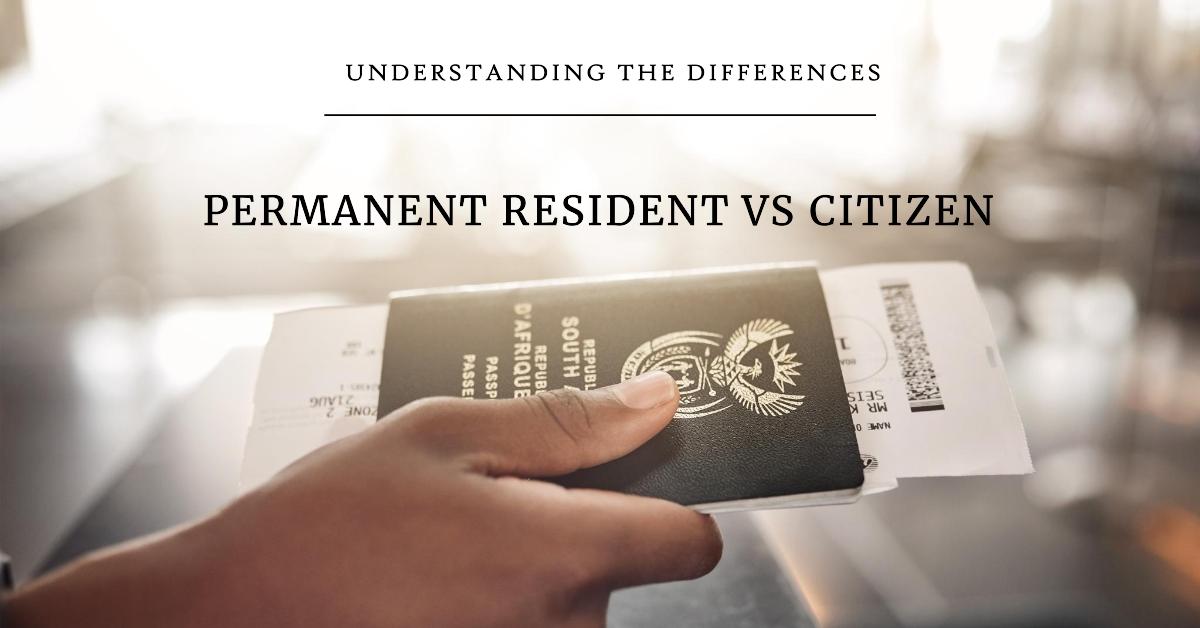The terms “resident” and “citizen” are sometimes used equally since they refer to the same legal status for the people living in a particular country. The definitions of citizenship, lawful permanent residency, and the legal distinction between a citizen and a resident will all be covered in length in this article.
What is the difference between being a permanent resident and a citizen?
There are quite a few distinctions between being permanent residents or citizens, mainly in your legal status in the eyes of a host nation.
A citizen is a person who holds the nationality and passport of a country, for example, a U.S. citizen who holds a U.S. passport is bound to the USA through allegiance, governance, and taxation. Citizens have all the rights a country can give, from voting, running for office, working, opening a business, social security, access to healthcare, free public education, and more depending on the country. Citizens cannot be deported, and U.S. history and government statutes show that U.S. citizens have a multitude of rights not even the government can deny.
On the other hand, someone holding a permanent resident status is a foreigner who is legally allowed to reside within a country indefinitely. Green card holders, for example, are lawful permanent residents who are allowed to live in the United States as long as they wish under certain circumstances such as maintaining the good moral character and meeting the physical residency requirement to renew your permanent residency card.
Permanent residents, generally speaking, usually have the same rights as citizens with the exception of political rights such as voting, running for office, joining particular political parties, and more of the same, of course, is a general rule and depends on the host country.
If you hold a U.S. green card, for example, you have the right to live in the U.S. indefinitely and the right to work in the U.S., but you do not have the right to vote in U.S. elections, nor can you run for office in the U.S. government. Only U.S. citizens can vote and run for office, if you would like to do so you need to apply for U.S. citizenship to gain the entire benefits of U.S. citizenship.
Although not yet U.S. citizens, green card holders, although they do not hold a U.S. passport, are granted the right to reenter the United States as they please without a visa as long as they maintain a good moral character and are not deported. This is just one of the reasons many people aim to obtain a green card.
While we have focused on the U.S. immigration law, this premise is generally similar in many countries such as the UK, Germany, Canada, Australia, and many more. Some countries do not have a lawful permanent resident status such as KSA or Qatar, in which case people either reside temporarily or are citizens, nothing in between.
What is an immigration status?
Immigration status refers to your legal status in a foreign country/region. For example, you may be in a foreign country on a temporary work permit, in this case, you are a temporary resident. If you stay long enough you may upgrade your residence standing, along with your accompanying family members of spouse and children, from temporary residents to permanent residents. In the UK, for example, it takes five years of continuous, legal residence to be able to apply to become permanent residents.
Your immediate relatives of spouse and unmarried children will normally have an immigration status of dependents if you are on a temporary permit. Once you upgrade to permanent residence their standing shifts from dependent visas to lawful permanent residents.
What is the meaning of permanent residence?
Permanent resident status means you and your family members who are permanent residents enjoy many benefits as they can reside, work, and study freely within a country. The most famous permanent residence in the world may be the U.S. green card, as its holders have the right to live in the United States indefinitely and enjoy all the perks that come with their permanent residency status.
What can I do as a permanent resident?
Generally speaking, permanent residency gives you all the benefits and rights that citizens have except political ones. You are free to live in the country along with your family members and unmarried children who obtain a permanent residence with you, and you can work, study, and pursue business within the nation. You will also be eligible for social security benefits if you meet certain criteria.
Even if you travel outside the host nation to another country, you are granted the right to reenter without the need to obtain a visa. This immigrant status is the highest one can achieve without becoming a citizen.
Permanent residents are also eligible for naturalization in many countries and may apply for citizenship along with dependent relatives such as their children and spouse if they meet certain requirements. There are differences between countries when it comes to naturalization law, but the main eligibility requirement in most of them is that the immigrant legally meets a certain physical occupancy quota.
Can a permanent resident become a citizen?
Generally speaking, yes. Most countries allow permanent residents to apply for citizenship after meeting some eligibility criteria. Other countries, such as the UAE, do not have a clear path to naturalization for permanent residents. So it depends on the government of each country.
But going back to the most common practice, which is granting a permanent resident and their family the opportunity to obtain citizenship if they are eligible and meet all the requirements, we can take the U.S. as a great example.
The U.S. State Department, along with the USCIS, act as the federal government immigration services branches. The U.S. state department has offices all around the world, while the USCIS handles immigration services within the USA itself. Both of these entities, working in tandem, facilitate immigration to the USA by providing applicants channels to apply for green cards and various immigration visas, and the laws they set forth also allow foreign national green card holders to apply for U.S. citizenship along with their eligible family members if they meet all the USCIS naturalization requirements and submit an N 400 petition form.
The process can be quite complex and the federal requirements must all be met before applying to become a U.S. citizen, so we advise you to employ the legal advice and services of an immigration attorney or a law firm adept in U.S. immigration law with extensive experience in filing a DS- 260 petition form for green cards and an N 400 citizenship petition form.
Using the services of an attorney or a law firm can make your application to the federal government much easier and an experienced immigration attorney can help you circumvent any mistakes or issues that may lead the federal government to refuse your application. The attorney can also follow up on your behalf as the application may take some time.
Frequently asked questions
What comes first, citizenship or residency?
Normally, residence comes before citizenship, except in the case of applying for citizenship by investment in countries such as Dominica, as you can directly gain citizenship there.
Who qualifies as a citizen?
Anyone who holds a country’s passport and citizenship certificate qualifies as a citizen of that country.
Do Permanent residents get passports?
No, permanent residency does not grant passports, only a residency card.
What is the difference between temporary and permanent residence?
Temporary residency is bound by a certain period of time, while permanent residency is indefinite. The latter usually grants more rights to its holder.


